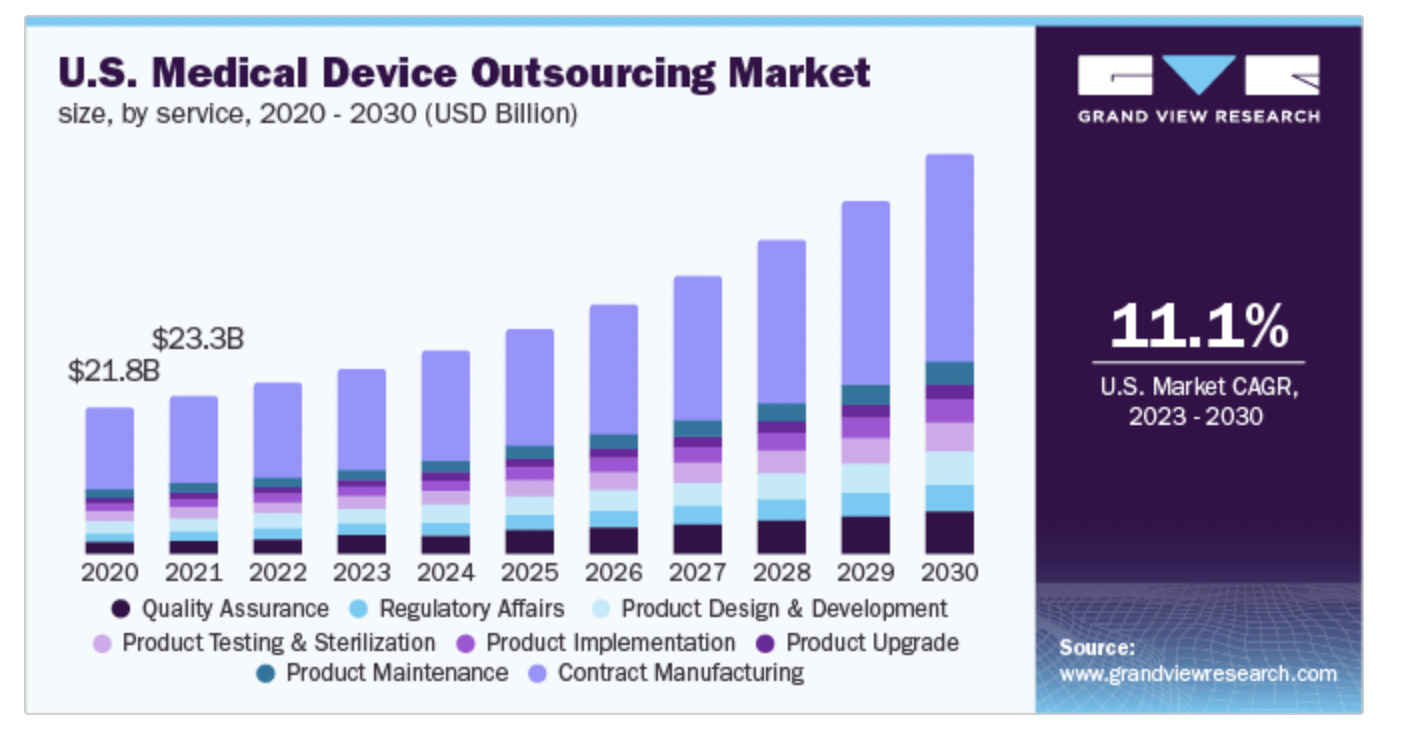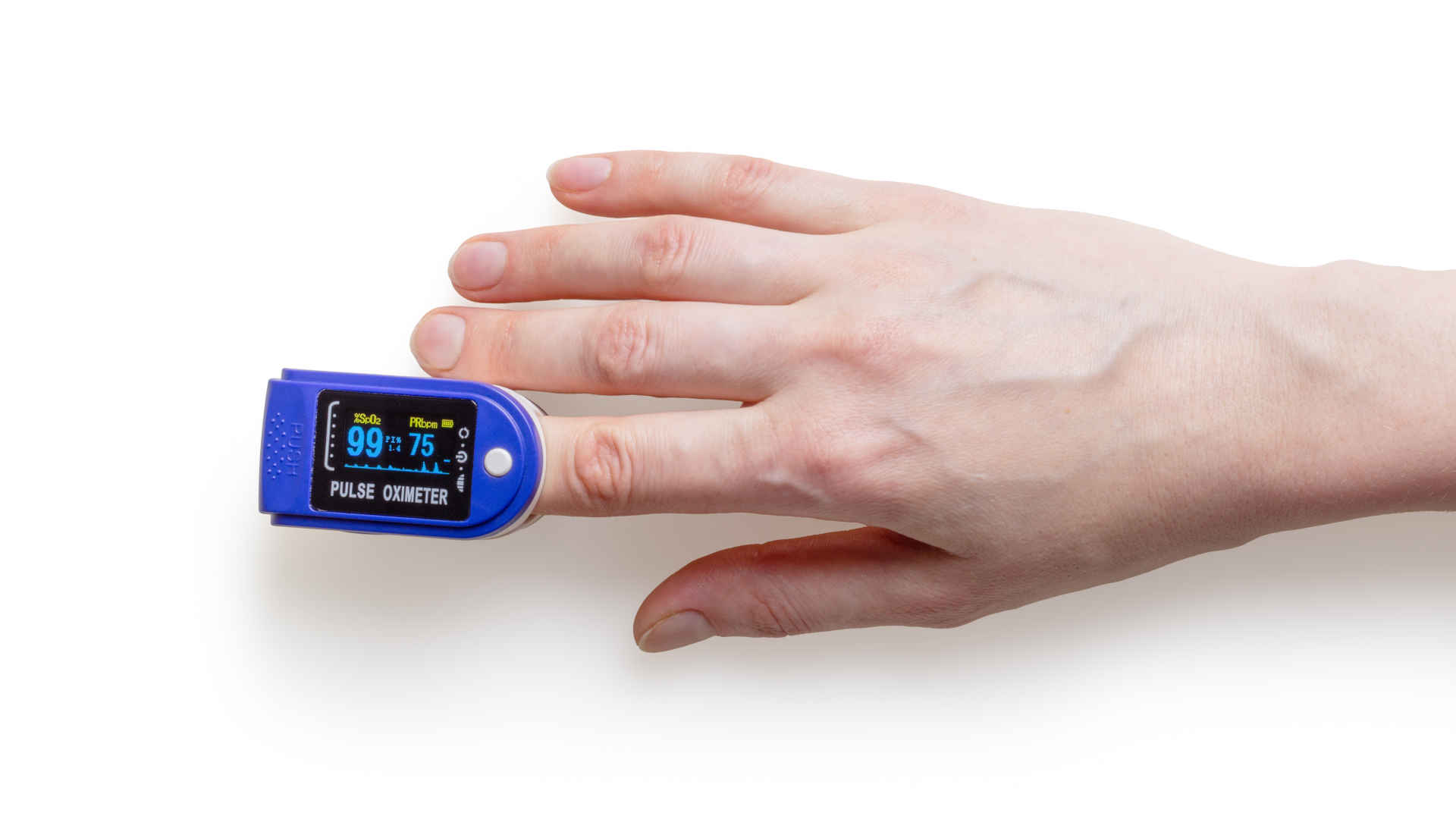Pros and Cons of Outsourcing for Advanced Medical Device Development
Many global factors are converging to increase the demand for advanced medical devices in the next decade. At the same time, industry stakeholders know that taking a medical device from concept to market is a very expensive and complex process.
Not surprisingly, outsourcing is emerging as an important option for advanced medical device development. Grandview research values the global medical device outsourcing market at USD 117.5 billion in 2022 and expects it to increase at a compound annual growth rate (CAGR) of 12.1% from 2023 to 2030.

Source: Grandview Research
Factors affecting the marketplace valuation for advanced medical device outsourcing include:
- Rise in cases of chronic and lifestyle diseases
- Increase in average lifespan among large demographic cohorts
- Rising demand for advanced and technologically superior medical devices
- Increasing price competition among leading industry players
- Requirements for reducing the development costs
- Increasing complexity, difficulties, and potential complications in product engineering
Outsourcing can encompass a range of activities, from product design and engineering to prototyping and manufacturing. By leveraging the expertise of external partners, companies can make their projects faster, more cost-effective, and more reliable.
Pros and Cons of Outsourcing for Advanced Medical Device Development Click To TweetIf outsourcing offers so many advantages, why don’t all teams outsource development?
While outsourcing works for some advanced medical device projects, it turns out that outsourcing is not a silver bullet or “set it and forget it” approach. Let’s look at some advantages and disadvantages of outsourcing advanced medical device development.
Advantages of Outsourcing Advanced Medical Device Development
Outsourcing advanced medical device development can bring several advantages to organizations, starting with cost savings.
Outsourcing for HR Cost Savings
Human resources cost savings is the most common reason companies across any industry outsource. Companies can access skills and services in countries with lower wage rates than if they were to keep the work in-house.
For example, companies pay US-based software engineers an average of $110,000 per year, the highest salaries worldwide. Compare that with annual salaries from Poland at $22,740, for example, and India at $7,725. Given that medical device development can span several years, it is easy to see how outsourcing offers huge savings potential on salaries.
Not only is straight compensation a consideration, but tax and HR regulations create expensive overhead for hiring and employing people in the US. By outsourcing development activities, companies can avoid the overhead of staffing up teams with costly employees.
Another advantage of outsourcing is providing organizations with access to a broader range of skills and expertise than they could build and support internally. If a project needs expertise at certain critical milestones, outsourcing can provide that augmentation as part of the overall contract.
Outsourcing to Optimize Productivity
Outsourcing can also help reduce turnaround times because outsourced professionals can focus solely on the specific task and avoid being pulled away for other tasks within the client company.
Companies can also leverage time zone differences. When outsourcing with teams across time zones, it is possible to create an almost 24/7 development cycle where local teams pick up in the morning on work done the night before in another time zone.
Outsourcing to Save on Facilities Costs
Companies that outsource projects also don’t have to invest in expensive equipment, labs, or facilities that the developers need either temporarily or for the project’s duration. Avoiding facility overhead can result in significant cost savings over the development life cycle of an advanced medical device.
Disadvantages of Outsourcing Advanced Medical Device Development
Overall, outsourcing advanced medical device development can be an excellent way for organizations of all sizes to reap numerous benefits while keeping costs low. However, it is not a perfect solution for all cases. Let’s look at some potential disadvantages.
Intellectual Property Risks
One important consideration with outsourcing advanced medical device development is intellectual property protection. When third-party companies are involved in a project, all parties need to agree upon contractual terms and conditions that protect both sides from any unauthorized use of materials or products created during development.
While it may be tempting to gloss over this point to save money or time, a lack of clarity could result in costly legal proceedings should either side breach any agreements regarding intellectual property rights.
Loss of Control
One of the main disadvantages of outsourcing advanced medical device development is a potential loss of control over the project. When an organization outsources its work, they often work with an outside contractor who needs to understand its exact needs and requirements.
If mutual understanding is not in place, confusion can lead to a lack of communication throughout the process, which in turn can cause delays in getting started on the project or completing it on time.
Another issue is that an outside contractor may not be able to guarantee access to all the resources needed for the successful completion of the project, resulting in additional delays and potential cost overruns.
Communication Challenges in Outsourcing
A further disadvantage is that there can be communication issues between the organization and the vendor due to possible language barriers or geographical distance. Limited understanding between both parties makes it difficult to effectively collaborate on ideas or discuss difficulties that come up during development. Communication snags can lead to missed deadlines or other problems that impede progress on the device development roadmap.
Moving Ahead
By taking advantage of outsourcing in advanced medical device development processes—while keeping lines of communication open between internal teams and external partners—companies can unlock a range of opportunities to increase efficiency. All of this while maintaining control over critical aspects throughout the life cycle of each product.
Are you considering outsourcing? We have years of experience with a variety of projects using outsourcing. Contact us today to start a conversation about the pros and cons of outsourcing your project.






